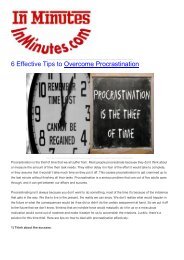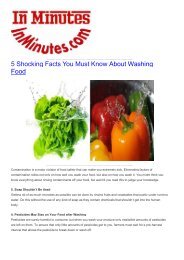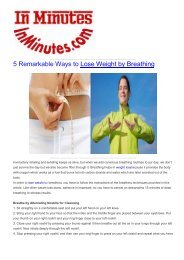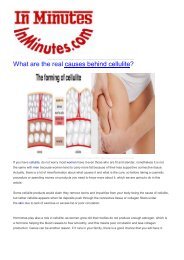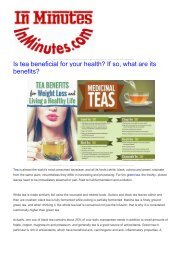6 Body Changes of Becoming a Vegetarian You Should Know
More and more people are abandoning eating meat either as a statement against animal cruelty or just as a health option. A sudden stop of meat consumption without considering the proper replacements may have drastic positive and negative changes on the body of a vegetarian or a vegan. Read on to get an idea on what would occur when you depend mostly or solely on flora for nutrition.
More and more people are abandoning eating meat either as a statement against animal cruelty or just as a health option. A sudden stop of meat consumption without considering the proper replacements may have drastic positive and negative changes on the body of a vegetarian or a vegan. Read on to get an idea on what would occur when you depend mostly or solely on flora for nutrition.
Create successful ePaper yourself
Turn your PDF publications into a flip-book with our unique Google optimized e-Paper software.
.....................................................................................................<br />
6 <strong>Body</strong> <strong>Changes</strong> <strong>of</strong> <strong>Becoming</strong> a <strong>Vegetarian</strong> <strong>You</strong><br />
<strong>Should</strong> <strong>Know</strong><br />
.....................................................................................................<br />
More and more people are abandoning eating meat either as a statement against animal cruelty or just as a<br />
health option. A sudden stop <strong>of</strong> meat consumption without considering the proper replacements may have drastic<br />
positive and negative changes on the body <strong>of</strong> a vegetarian or a vegan. Read on to get an idea on what would<br />
occur when you depend mostly or solely on flora for nutrition.<br />
6. Improvement <strong>of</strong> Cardiovascular Health<br />
A vegetarian diet has proven to be anti-inflammatory compared to a carnivore diet which can<br />
increaseinflammation levels. Inflammation contributes to increasing the risk <strong>of</strong> dying from ischemic heart disease<br />
where the coronary arteries suffer from narrowing or complete closing; thus depriving the heart from oxygen and<br />
essential nutrients. Studies that compared vegetarians and non-vegetarians with similar lifestyles showed that<br />
vegetarians are 24% less likely to die from ischemic heart disease.<br />
5. Loss <strong>of</strong> Taste
Red meat and oysters are loaded with zinc which is fundamental for maintaining your senses <strong>of</strong> taste and<br />
hearing, and for helping your immune system. A Japanese study showed that taste impairment is mainly caused<br />
by zinc deficiency. Zinc is also available in legumes, beans, whole grains, nuts and seeds but these also contain<br />
phytic acid which can interrupt the absorption <strong>of</strong> the mineral. In order to compensate for the scarce amounts <strong>of</strong><br />
zinc in a vegetarian diet, vegetarians must consume 50% more zinc than meat eaters do.<br />
4. Weight Loss<br />
Being under a serious vegetarian diet can make you drop pounds. The reason for weight loss is probably<br />
because you stop consuming meat fats. A study showed that although vegetarians didn’t aim for losing<br />
weight with their diet, most <strong>of</strong> them did. However, a vegetarian diet is not free from carbohydrates and fats so if<br />
you do not take care you may put on extra weight.<br />
3. Hard Muscle Recovery<br />
Maintaining muscle mass needs the availability <strong>of</strong> protein especially if you are exercising to build muscles. <strong>You</strong><br />
can replace animal protein with plant protein, but the second needs more time to be available to repair your<br />
muscles. The best way to get protein post-workout if you were a vegan or vegetarian is to drink it in liquid form.<br />
There are several smoothie recipes that can provide the necessary post-workout nutrients. <strong>You</strong> will need to mix<br />
fresh fruits, for restoring energy providing glycogen, with almond milk, soy milk, coconut milk, rice milk or hemp<br />
milk. Here is an awesome smoothie recipe: a banana, a cup <strong>of</strong> frozen blueberries and strawberries, 3/4 cup<br />
nonfat Greek yogurt, a tablespoon <strong>of</strong> peanut butter, a cup <strong>of</strong> spinach, a tablespoon <strong>of</strong> hemp seeds and a cup <strong>of</strong><br />
any <strong>of</strong> the aforementioned milks. The color <strong>of</strong> this smoothie might not be encouraging but it tastes great and is<br />
surely nutritious.<br />
2. Supplement Need<br />
When food items are chosen wisely, a vegetarian can get the same amount <strong>of</strong> calcium, vitamin B12 and iron that<br />
a non-vegetarian does. However, if it is difficult to eat or drink what contains these important minerals, you should<br />
consult a doctor to recommend the best supplements for you. Don’t forget that you may also need to include zinc<br />
along with the supplements.<br />
1. Gain <strong>of</strong> Healthy Bacteria and Temporary Bloating<br />
Plant protein can be digested with the available enzymes in our guts, but the carbohydrates that come along with<br />
these proteins are probably indigestible. The availability <strong>of</strong> such carbohydrates increases the numbers <strong>of</strong> healthy<br />
bacteria in the intestinal tract. The increase <strong>of</strong> bacteria population will make you feel a little bloated and gassy but<br />
this feeling will fade as your body get used to the new diet.
<strong>Becoming</strong> a <strong>Vegetarian</strong>, Health, health care





